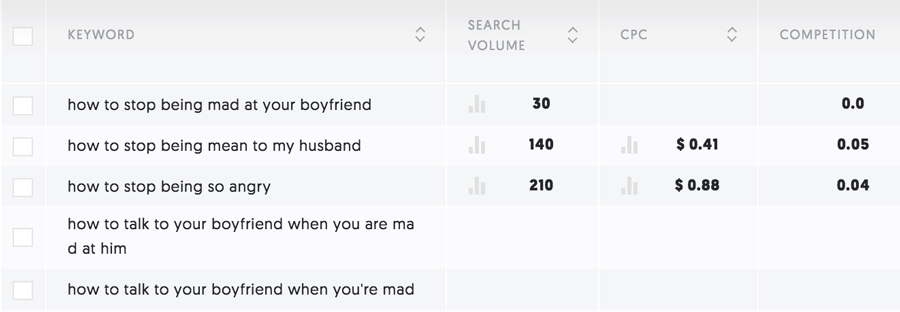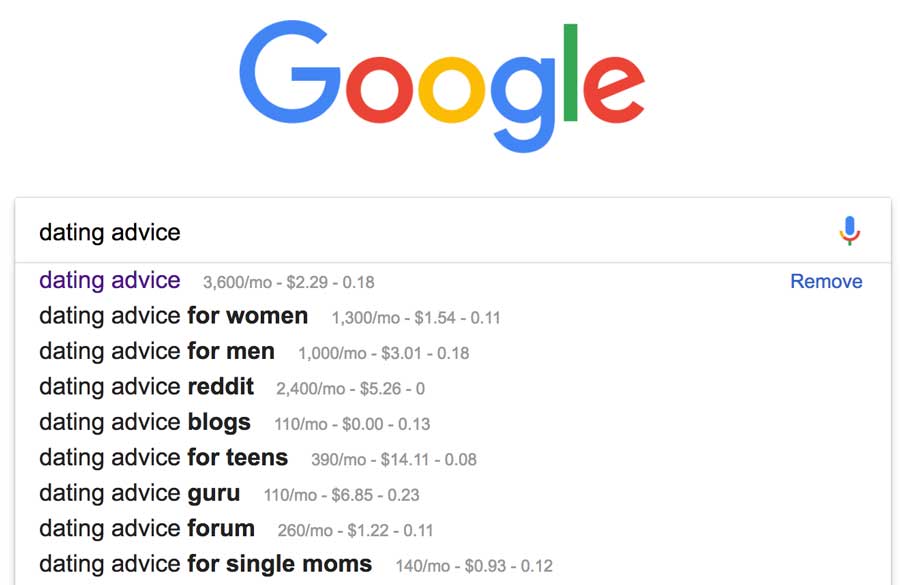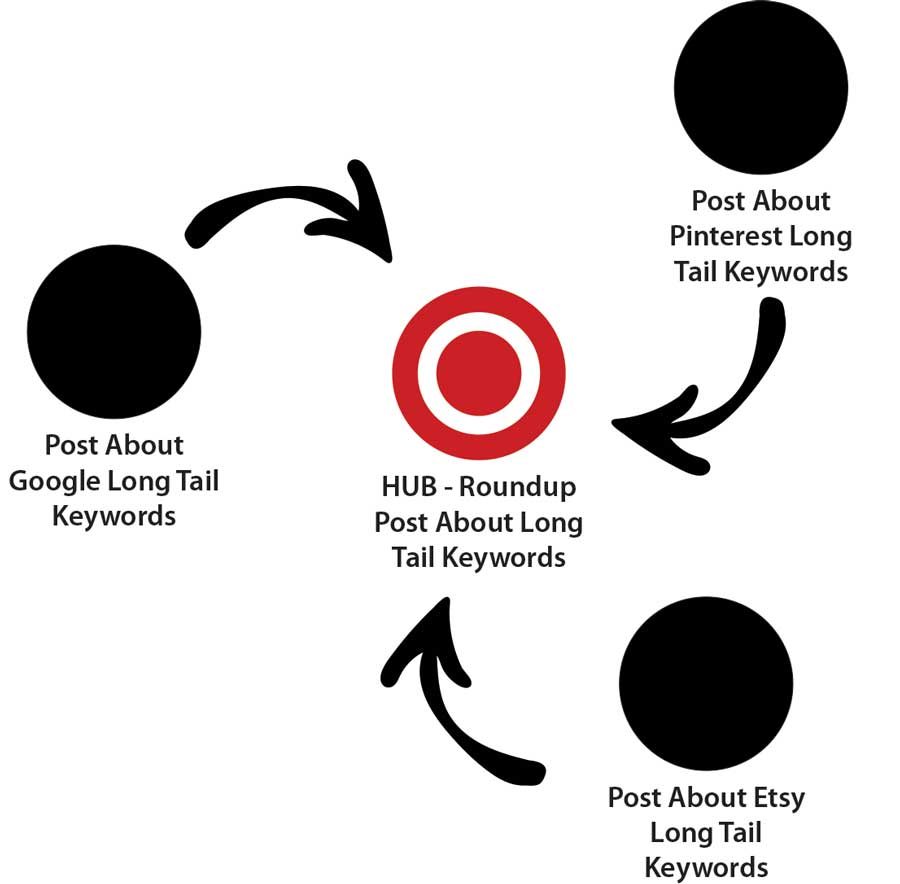You probably got into blogging because you love writing or taking pictures or connecting with a tribe. Hardly anyone says they got into blogging because they love SEO (except for me!) Here are all my best tips, ideas and & advice for understanding long tail keywords for Google SEO.
How To Title Long Tail Keyword Blog Posts That Will Get You Google Traffic
In talking with a gal on Facebook today I realized that, like many great bloggers she was having a hard time understanding what long tail keywords really are. She had written a blog post and then asked why she wasn't getting more Google traffic from that post. Let's say her blog title was “How To Talk To Your Boyfriend When You Are Mad” and in it she was talking about relationships.
She had tons of great suggestions in her content and it looked like she had put a bunch of time into writing it. But functionally she said the keyword she was trying to rank for was “talk to your boyfriend when you are mad”. Sigh.
Doing a search on Ubersuggest for “talk to your boyfriend when you are mad” shows no searches, no cpc (paid advertising) and no competition.
What that means is that she could have the greatest post in the world, but she won't get much Google traffic from it because people are not typing that into Google when they are looking for help.
So how can we fix this?
1. When You Are Doing Long Tail Keyword Research Back WAY Up
So let's start with what this post is really about…. dating. She is talking about what to do when you are mad at your boyfriend, not husband, boyfriend. She might also be talking about relationships or anger, but we are going with dating for this one.
So the first word in our long tail keyword is Dating!
Doing a Google search using the Keywords Everywhere plugin in Chrome we can see dating has a high search volume… whoo whoo.
What is not so great is how many results we get when we hit the search button…
Ouch! There are almost 700 MILLION competing results so we have to go a little further in our long tail!
2. What Are You Talking About In Your Post?
This blogger was talking about what to do, which I generally call “advice”. So let's see if Google thinks it should be advice or maybe it is tips… hmm, better check to make sure!
Doing the search we find that “dating advice” gets 3,600 searches a month and “dating tips” only gets 2,400 searches a month so our two word long tail keyword is “Dating Advice“…ya ho.
But doing a search for that term we find that there are still A LOT of competing sites…. we are down to 616 MILLION… rats.
3. Going Deeper On Our Long Tail Keyword
When we did the search for dating advice Google gave us some suggestions…
Ohhh interesting! Dating advice for women is looking good, but what about that cool one down there… “dating advice for single moms”…. hmmm interesting!
Now you might be thinking, “hold on, there are only 140 searches a month for that term”, and you would be right! But don't forget, we also have the millions for the “dating” and “dating advice” in our long tail so now is the time to niche down!
This is why it is good to think about going deep…
- Dating Advice For Women – there are 1.300 searches a month and 1,090,000 results
- Dating Advice For Single Moms – there are 140 searches a month and only 47 exact match results
I found out the EXACT number of people who have that term by putting quotation marks around my long tail keyword. This makes Google tell us EXACTLY how many people have blog posts with that exact phrase in their title.
Now, let's call a spade a spade, no real searcher uses quotation marks, but that does give us a really good idea of how we could get ranked quickly for a long tail keyword.
4. But what about her original topic?
We originally started with “How To Talk To Your Boyfriend When You Are Mad” so we have to work that into our title somehow and just tacking on our long tail phrase would make our title REALLY long.
So what about “Dating Advice For Single Moms – Should You Talk To Your Boyfriend When Mad?” Not too bad grammatically and still gets our long tail keyword in there!
Honestly, when you are trying to rank for a long tail keyword, the target keyword is the most important and THEN you wow them with your content!
Long Tail Google Keywords FAQ
When I teach about this in person I get A LOT of questions. Here I will try to answers the ones that come up the most!
Should All Your Posts Start With That Phrase?
Good question! When you have done all that work to find a good long term phrase it can seem like you should double or triple down and use it on every post.
But no, you want to rank for LOTS of long term phrases that go with your niche so you would mix things up… here are some other ideas you could write about that would match AND have strong long tail keywords of their own.
- Dating Advice For Women – Should You Kiss On The First Date?
- Does Tinder Work For Single Moms – Over 40 Dating Tips
- 5 Nice Ways To Break Up – Relationship Advice For Women Over 40
As you can see, all of these have a strong long term keyword, they are all in the same niche and would all appeal to Google in different ways.
Wouldn't It Make More Sense To Start With One Word?
It can be tempting to try to rank for a single keyword like dating, but honestly as bloggers we really don't have a chance. Doing a quick search on Google the top ranking sites for this term are:
- Wikipedia
- Dating.com
- Urban Dictionary
- OK Cupid
- Elite Daily
- Glamour Magazine
- Tinder
Those sites have way deeper pockets to pay for advertising and produce way more content than any single blogger could in a lifetime of writing!
So Are You Stuck Writing About Just One Topic?
All my creative peeps worry about this, so right up front, NO! But they should all be somewhat related.
For example I writing generally about marketing and then about blogging or photography or Etsy. My umbrella is marketing and everything else falls under that.
Some ways you can pick your “umbrella” site concept:
- Topic – This would be something like politics, food, survival, dogs, scrapbooking
- Reader Type – You could pick a type of reader moms, pet owners, doctors, small business owners
- Demographics – You use demographics like gender, age, race, income
- Location – This could focus on a city, state, country or even on something like beaches or mountains
Google really likes when it generally knows what you are talking about and then you branch off into how you like to talk about it.
Link Your Posts Together Using Your Keywords
Once you have some posts written you want to link them together using your keyword. For example, I linked “demographics” above to my post about customer demographics.
When the Google spider “crawls” your site it will see that link and follow it. This is a super simple way that you can tell Google what the linked post is about.
This doesn't provide a lot of “Google Juice” to that post, but it does help reinforce that you are an authority in that topic.
Make A HUB Post
On a lot of sites I find that bloggers have a bunch of different posts, but not one main post they are trying to rank for on a given topic. For example, I will eventually write a “roundup” post about long tail keywords and link to that from all the different kinds of long tail posts I have on my site.
When you are planning out your content you can start to think of what main post you would like to rank for and drive all your links to there inside your site.
Have An Aspirational Keyword
Now that you have read all of this we can talk about how your site starts to rank for keywords up the longtail chain.
In this example the highest aspirational keyword I would honestly try to rank for is “Dating Advice”. I would write 10 or so posts on this topic using different keywords and link them.
When I started blogging my aspirational keyword was “Real Estate Marketing” which is a super competitive keyword. During the first year or so none of my posts ranked for that term, but I did start to get some first page listings for “Funny Real Estate Postcards” and “Marketing To A Farm”. These are topics that are sub categories of my aspirational keyword.
Over time as you write more and more posts, Google will start to realize that is what they should rank your site for!
Long Tail Keywords For Google Wrapup
There you go! If you just start to understand this concept you can get better traffic from Google pretty easily. The gal in the example would not have to change much to greatly increase her traffic.
It might be worth trying this on some of your blog posts that you thought were really good but then didn't rank for any keywords. Start with the highest level of what is about and then figure out a strong long term keyword you can change the title to! do not change the “permalink” … Google probably has your post indexed so just update the title









